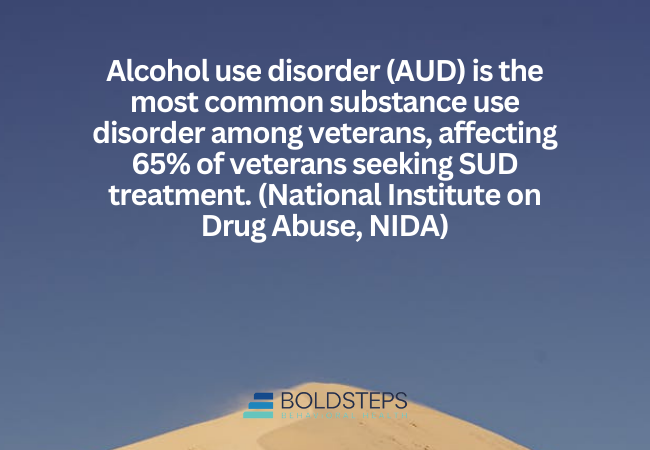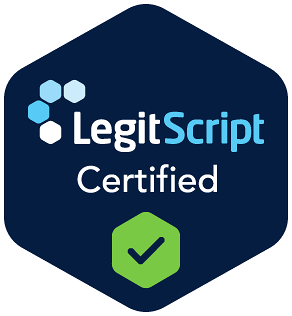Veterans face unique challenges that can impact their mental health, well-being, and overall quality of life. The transition from military service to civilian life, exposure to trauma, and the physical demands of service can contribute to substance use disorders (SUDs), post-traumatic stress disorder (PTSD), and other co-occurring mental health conditions. Unfortunately, many veterans struggle to access the treatment they need due to stigma, limited resources, or difficulty acknowledging their struggles.
At Bold Steps Behavioral Health in New Hampshire, we recognize the sacrifices veterans have made for our country, and we are committed to providing the specialized care they deserve. Our Addiction Treatment Program, Dual Diagnosis Treatment Program, and other comprehensive services ensure that veterans receive the support needed to heal from both addiction and mental health challenges.
This guide explores the essential programs available to veterans and how Bold Steps Behavioral Health can help those who have served find lasting recovery.
Understanding the Challenges Veterans Face in Recovery
Military service comes with significant stress, which often has long-term effects on veterans. These challenges can make it difficult for veterans to transition to civilian life and maintain their mental well-being.
1. Post-Traumatic Stress Disorder (PTSD) and Trauma
- Studies show that 30% of veterans who served in combat experience PTSD.
- Trauma can cause flashbacks, nightmares, and heightened anxiety, often leading to substance use as a way to self-medicate.
2. Chronic Pain and Prescription Drug Misuse
- Many veterans suffer from chronic pain from service-related injuries.
- More than 10% of veterans report misusing prescription opioids to manage pain, leading to dependency.
3. Depression, Anxiety, and Suicide Risk
- Veterans often struggle with depression and anxiety due to isolation, difficulty reintegrating into society, and loss of purpose.
- The suicide rate for veterans is 57% higher than non-veterans, underscoring the urgent need for mental health care.
4. Homelessness and Unemployment
- Veterans account for 11% of the homeless adult population in the U.S.
- The lack of stable housing and employment increases the risk of substance abuse and untreated mental health conditions.
Essential Treatment Programs for Veterans at Bold Steps Behavioral Health
At Bold Steps Behavioral Health, we offer evidence-based treatment programs designed specifically for veterans. Our programs address both addiction and co-occurring mental health disorders, ensuring a comprehensive recovery approach.
1. Medical Detox Program for Veterans
Detox is the first step in recovery for veterans struggling with substance use. Stopping alcohol, opioids, or other drugs suddenly can be dangerous, making a Medical Detox Program essential.
How Our Medical Detox Program Helps Veterans:
- 24/7 medical supervision ensures safety during withdrawal.
- Medication-assisted treatment (MAT) reduces cravings and withdrawal symptoms.
- Emotional support from therapists and counselors helps veterans manage the psychological impact of detox.
Detox provides a stable foundation for veterans to transition into structured treatment programs.
2. Dual Diagnosis Treatment for PTSD and Addiction
Many veterans struggle with co-occurring disorders, meaning they have both a substance use disorder and a mental health condition. At Bold Steps Behavioral Health, our Dual Diagnosis Treatment Program is tailored to address these challenges.
Key Features of Dual Diagnosis Treatment:
- Trauma-informed therapy helps veterans process PTSD, anxiety, and depression.
- Cognitive Behavioral Therapy (CBT) teaches coping strategies for managing triggers.
- Medication management supports mental health stability.
This program ensures that both addiction and mental health issues are treated together for long-term recovery success.
3. Partial Hospitalization Program (PHP) for Veterans
Veterans needing structured, intensive treatment without full-time residential care can benefit from our Partial Hospitalization Program (PHP).
Why PHP is Effective for Veterans:
- Comprehensive therapy includes full-day sessions with individual and group therapy.
- Peer support connects veterans with others facing similar struggles.
- Holistic healing options such as mindfulness training, fitness programs, and nutrition support enhance recovery.
PHP allows veterans to receive high-quality treatment while maintaining some independence.
4. Intensive Outpatient Programs (IOP) for Veterans
For veterans who need flexible treatment while balancing work, family, or school, our Intensive Outpatient Program (IOP) is a great option.
Benefits of IOP for Veterans:
- Flexible scheduling with therapy sessions several times per week.
- Trauma-focused care addresses service-related stress.
- Relapse prevention strategies teach coping mechanisms for long-term sobriety.
IOP allows veterans to continue their daily responsibilities while staying engaged in their recovery.
5. Outpatient Treatment Program for Long-Term Recovery
Recovery is a lifelong journey, and veterans need ongoing support to maintain sobriety. Our Outpatient Treatment Program offers continued therapy, counseling, and peer support.
How Outpatient Care Helps Veterans:
- One-on-one counseling provides personalized therapy sessions.
- Group therapy encourages veterans to share experiences and gain support.
- Aftercare planning helps veterans build a stable, substance-free life.
This program is ideal for veterans who have completed higher levels of care but still need continued support.
6. Virtual Treatment Program for Veterans in Remote Areas
Many veterans face barriers to attending in-person treatment due to location, transportation, or scheduling conflicts. Our Virtual Treatment Program provides online access to professional care.
Benefits of Virtual Treatment for Veterans:
- Telehealth therapy allows veterans to access treatment from home.
- Flexible scheduling fits into veterans’ busy lives.
- Confidential and secure treatment ensures privacy and accessibility.
This program makes quality care available to all veterans, regardless of where they live.
The Role of Family in Veteran Recovery
Veterans often rely on family members for emotional and practical support during recovery. At Bold Steps Behavioral Health, we offer Family Therapy and Support Programs to help loved ones navigate the recovery process together.
How Families Can Support Veterans in Recovery:
- Participating in family therapy helps rebuild trust and communication.
- Learning about addiction and PTSD fosters empathy and patience.
- Encouraging healthy routines such as exercise, healthy eating, and social connections supports recovery.
- Avoiding enabling behaviors while setting healthy boundaries helps veterans stay accountable.
Family involvement significantly improves long-term recovery outcomes for veterans.
Additional Resources for Veterans in Recovery
In addition to professional treatment, veterans can access external resources for extra support:
1. Veterans Affairs (VA) Addiction Treatment Services
- Offers inpatient and outpatient care for substance use and mental health disorders.
2. Veterans Crisis Line
- A 24/7 confidential helpline for veterans in crisis: Call 988, then press 1.
3. Support Groups for Veterans
- Alcoholics Anonymous (AA) and Narcotics Anonymous (NA) provide peer-led recovery support.
- Veterans peer support groups offer connections with those who have shared experiences.
At Bold Steps, we help veterans connect with these resources for ongoing support.
Why Choose Bold Steps Behavioral Health for Veteran Recovery?
At Bold Steps Behavioral Health, we offer a full continuum of care to meet veterans where they are in their recovery journey.
- Specialized veteran programs with trauma-informed care designed for military personnel.
- Experienced clinicians trained in PTSD and addiction recovery.
- Flexible treatment options with in-person and Virtual Treatment Programs available.
- Family involvement through education and support to strengthen relationships.
Take the First Step Toward Healing
Veterans deserve compassionate, specialized care for addiction and mental health challenges. If you or a loved one is a veteran struggling with addiction, help is available. Call us today at (603) 915-4223 or visit Bold Steps Behavioral Health to learn more about our veteran-focused treatment programs. Together, we can take the bold steps toward lasting recovery.
FAQ About Essential Programs for Veterans in Recovery
Why do veterans need specialized addiction treatment programs?
Veterans face unique challenges, including PTSD, combat trauma, chronic pain, and difficulties transitioning to civilian life. Specialized programs address these factors while providing trauma-informed care tailored to their experiences.
What types of addiction treatment programs are available for veterans?
At Bold Steps Behavioral Health, we offer a range of evidence-based treatment programs for veterans, including:
- Medical Detox Program for safe withdrawal management.
- Partial Hospitalization Program (PHP) for structured, intensive therapy.
- Intensive Outpatient Programs (IOP) for flexible treatment.
- Outpatient Treatment Program for continued recovery support.
- Virtual Treatment Program for remote access to therapy.
What is Dual Diagnosis Treatment, and why is it important for veterans?
Dual Diagnosis Treatment addresses both addiction and co-occurring mental health disorders, such as PTSD, depression, or anxiety. This integrated approach ensures that veterans receive comprehensive care for both conditions, reducing the risk of relapse.
How does trauma-informed care benefit veterans in recovery?
Trauma-informed care recognizes the impact of past trauma on addiction and mental health. By incorporating therapies like Cognitive Behavioral Therapy (CBT) and Dialectical Behavior Therapy (DBT), veterans can process their trauma in a safe, supportive environment.
Can veterans receive addiction treatment online?
Yes, Bold Steps Behavioral Health offers a Virtual Treatment Program that provides telehealth therapy and counseling for veterans who cannot attend in-person sessions due to location, mobility issues, or scheduling conflicts.
How does family involvement help veterans in recovery?
Family support plays a crucial role in long-term recovery. We offer Family Therapy and Support Programs to help loved ones understand addiction, rebuild relationships, and provide a strong support system for veterans.



